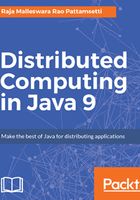
What is RMI?
RMI is a Java-specific object-oriented extension of the Remote Procedure Call (RPC). It provides a mechanism to create Java-based distributed applications. It allows an object in one Java Virtual Machine (JVM) to interact with the object in another JVM by invoking the methods in that object. This is why an application built with an RMI is considered an application that could run across multiple JVMs.
RMI provides communication between applications that are deployed on different servers and connected remotely using objects called stub and skeleton. This communication architecture makes a distributed application seem like a group of objects communicating across a remote connection. These objects are encapsulated by exposing an interface, which helps access the private state and behavior of an object through its methods.
The following diagram shows how RMI happens between the RMI client and RMI server with the help of the RMI registry:

RMI REGISTRY is a remote object registry, a Bootstrap naming service, that is used by RMI SERVER on the same host to bind remote objects to names. Clients on local and remote hosts then look up the remote objects and make remote method invocations.
The following are some of the design considerations of applications built with an RMI:
- Seamless method invocation on objects created across multiple JVMs
- Ensuring the remote method invocation integrates easily with general programming logic with no external IDL while retaining most of Java's object semantics
- Setting up the ability to distinguish between a distributed and local object model
- Assisting in building reliable applications while maintaining Java's safety and security
- Extending support to multiple transport protocols, various reference semantics, such as persistence and lazy activation, and various invocation mechanisms
- Handling issues such as running in different memory spaces, parameter passing, data binding, and other failures of RPC
- Handling any additional problems, such as distributed garbage collection and distributed class loading